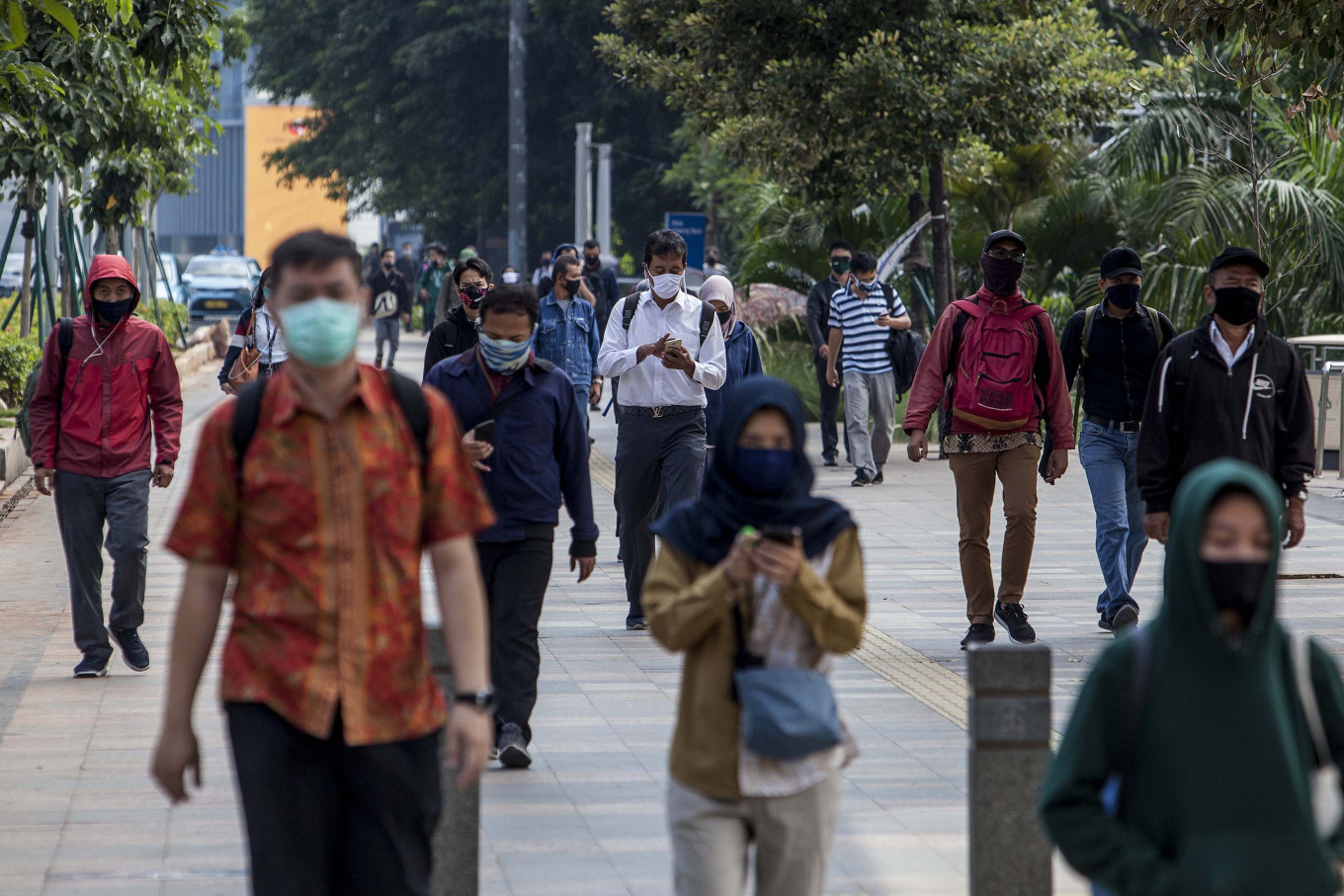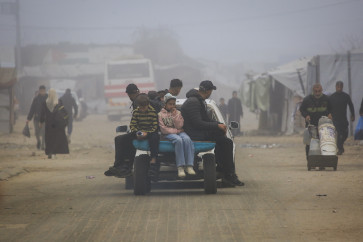Popular Reads
Top Results
Can't find what you're looking for?
View all search resultsPopular Reads
Top Results
Can't find what you're looking for?
View all search resultsIndonesia at 'near-certain recession' as recovery depends on virus control, economists warn
“We should have controlled the virus spread first before the economy could grow. If the virus cases declined, the economy would automatically pick up," University of Indonesia senior economist Faisal Basri told lawmakers.
Change text size
Gift Premium Articles
to Anyone
 Office workers walk toward their office buildings near the Dukuh Atas railway station in Central Jakarta on May 12. The government is campaigning heavily on the new normal protocols, including by wearing face masks, face shields and social distancing, among other measures, to rescue an economy reeling from the coronavirus pandemic. (JP/Seto Wardhana)
Office workers walk toward their office buildings near the Dukuh Atas railway station in Central Jakarta on May 12. The government is campaigning heavily on the new normal protocols, including by wearing face masks, face shields and social distancing, among other measures, to rescue an economy reeling from the coronavirus pandemic. (JP/Seto Wardhana)
I
ndonesia’s economy faces a “near-certain recession” in the third quarter this year, economists say, as a robust economic recovery will depend on whether the government can control the spread of the COVID-19 pandemic and stimulate people’s purchasing power.
The government will need to focus on controlling the coronavirus outbreak amid a rising number of coronavirus cases, said University of Indonesia senior economist Faisal Basri, adding that a strong economic recovery would come naturally if the threat of the outbreak was dealt with.
“We are afraid that the government’s policy response does not care about COVID-19 anymore by emphasizing heavily the economic recovery,” he told lawmakers in a hearing on Monday. “We should have controlled the virus spread first before the economy could grow. If the virus cases declined, the economy would automatically pick up.”
Indonesia booked record high single-day numbers of COVID-19 positive cases in three consecutive days from Friday to Sunday. The country’s economy shrank by 5.32 percent in the second quarter this year, the worst since 1999, as all components of economic activity slowed.
The economy may shrink by a further 3 percent in the third quarter, Faisal said, adding that the contraction was a result of “the government’s incompetence in handling the pandemic”.
The government, he went on to say, should follow the steps of countries like Singapore, Malaysia and Thailand by prioritizing the pandemic response over the economy, adding that such measures could allow the economy to recover at a faster pace.
“The government’s strategy in handling the pandemic is waiting for a vaccine, but before that happens, they do not have a strategy at all,” he told House of Representatives Commission VI overseeing trade, industry and state-owned enterprises.
The government is campaigning heavily on the new normal protocols, including by wearing face masks, face shields and social distancing, among other measures, to rescue an economy reeling from the coronavirus pandemic. However, the rising case numbers in recent months have shown that the government’s plan has yet to be effective in reducing the spread of infections.
“An economic recession is not doomsday and not something that we need to be scared of,” said Institute for Development of Economics and Finance (Indef) senior economist Enny Sri Hartati. The economy is at a “near-certain recession” based on several economic indicators in July such as retail sales and vehicle sales, among others, she added.
“The question is how to reduce the economic shocks by boosting people’s purchasing power and boosting [the resilience of] micro, small and medium enterprises,” she told the same hearing.
Enny urged the government to evaluate the current stimulus programs to reduce pressure on businesses’ cash flows and to give a boost to domestic demand. “If it is well-targeted, government spending will be crucial in stimulating the economy,” she added.
The government expects the economy to shrink by 2 percent at worst or post flat growth at best in the third quarter, Finance Minister Sri Mulyani Indrawati said recently, expecting the economy to shrink by 1.1 percent at worst for the year 2020.
The government will optimize state spending in the third quarter this year to help support the economy, said the Finance Ministry’s head of climate change and multilateral financing policy Adi Budiarso during the same hearing. “We will boost government spending that will support supply and demand in the economy,” he emphasized.









